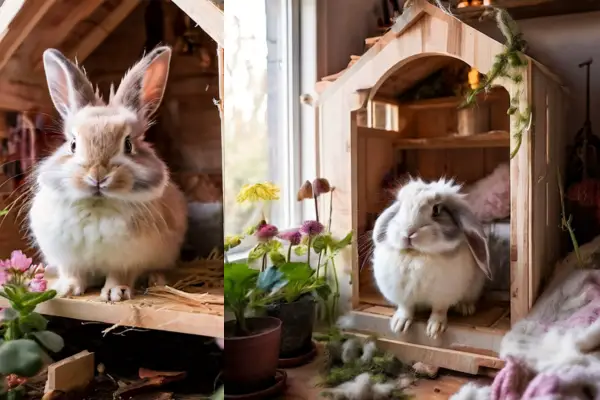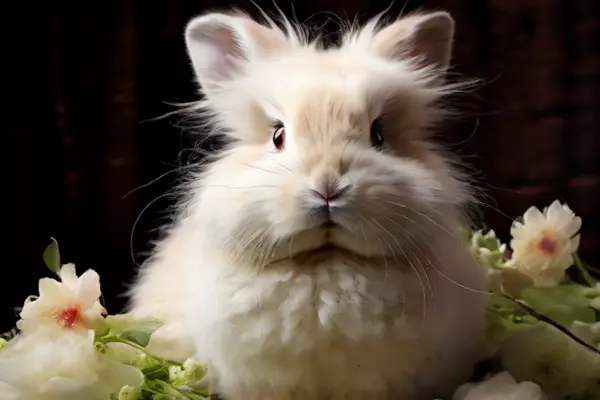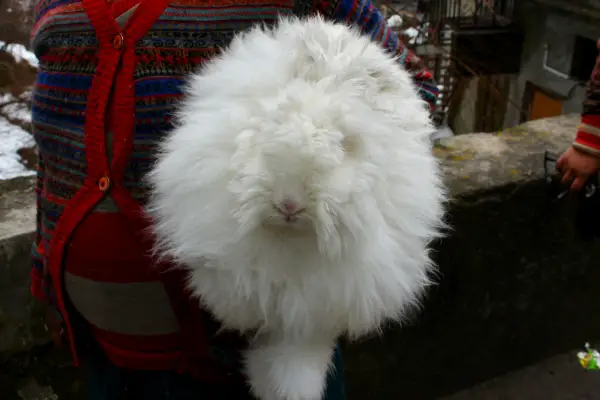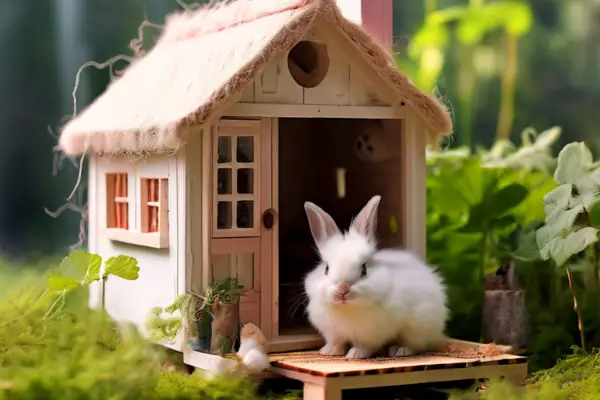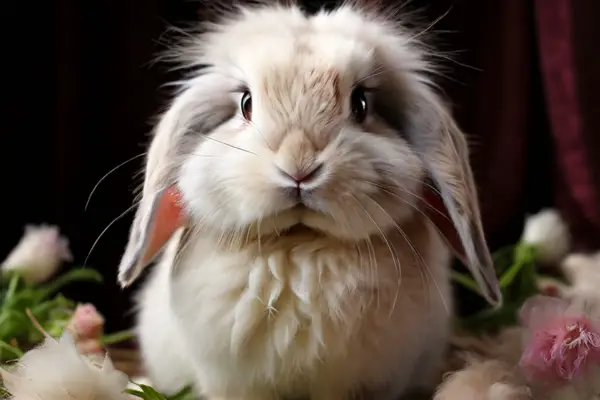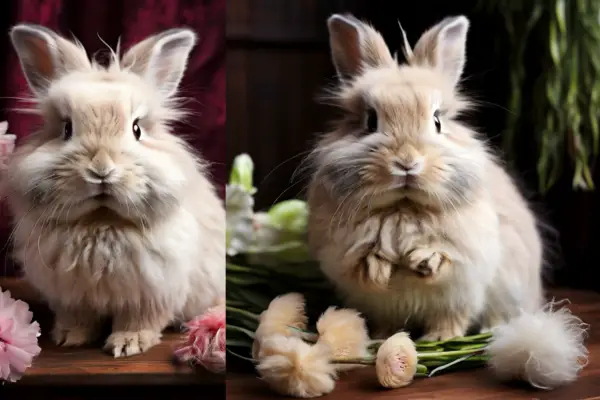The French Angora rabbit, with its distinctive fluffy coat and gentle temperament, makes for a unique and affectionate pet. However, potential owners must understand the specific needs of this breed to ensure their well-being.
From creating a comfortable habitat to maintaining a proper grooming routine, caring for a French Angora rabbit requires dedication and knowledge.
Key Takeaways
- French Angora rabbits require spacious enclosures, with a minimum size of 24″x24″, and larger spaces are preferred to ensure comfort and hygiene.
- These rabbits have a calm and social nature, but they require regular grooming to prevent matting and health issues due to their dense wool.
- Maintaining an appropriate temperature between 50-75°F is crucial for their health, whether they are housed indoors or outdoors.
- A balanced diet for French Angoras consists of hay, pellets, and fresh foods, with careful consideration of treats and foods to avoid.
- Regular health check-ups, vaccinations, and grooming routines, including nail trimming and dental care, are essential for the longevity and quality of life of French Angora rabbits.
Understanding French Angora Rabbits
Species Profile and Temperament
The French Angora Rabbit is a delightful breed, cherished for its unique wool and endearing personality. French Angora rabbits are docile and sweet, making them excellent companions for a variety of owners, from novices to experienced rabbit enthusiasts. They are known for their gentle and mellow temperaments, which contribute to their popularity as pets.
French Angoras are medium-sized rabbits, typically weighing between 7 to 9 pounds, with a lifespan of 7 to 10 years. They share similarities with breeds like the American Sable and Belgian hare, but stand out due to their distinctive wool.
Suitable for all experience levels, these rabbits thrive in environments where they can socialize and receive affection. Their amiable nature makes them a good fit for families with adolescents and other pets.
It’s important to note that while they are generally robust, French Angoras can be prone to dental issues due to their broad, shortened head. Regular veterinary check-ups are essential to monitor and prevent potential health problems.
Health Considerations and Lifespan
French Angora Rabbits are cherished for their long, soft wool and friendly demeanor, but it’s essential to be aware of their health considerations to ensure a long and happy life. French Angora Rabbits have an average lifespan of 7 to 10 years, which can be extended with proper care and attention to their specific health needs.
Common health issues include hairballs and parasitic infections such as tapeworm, roundworm, and pinworm. Preventative measures and prompt treatment when issues arise are crucial for maintaining their well-being.
While French Angora Rabbits are generally robust, they require a diet that supports their digestive system and regular grooming to prevent wool block, a condition caused by ingesting their own hair.
It’s also important to monitor for signs of allergies and other conditions that can affect their quality of life. Regular check-ups with a veterinarian familiar with rabbits can help catch and address health issues early on.
Grooming Needs and Maintenance
Proper grooming is essential for the health and well-being of French Angora rabbits. Regular brushing is necessary to prevent mats and tangles in their dense fur. It’s recommended to brush your Angora rabbit every couple of days, with more frequent grooming during shedding periods.
French Angoras require consistent grooming to avoid health issues such as wool block, which can occur if they ingest their own fur while self-grooming.
Here is a basic grooming schedule to follow:
- Daily: Check for mats and tangles
- Every 2-3 days: Brush thoroughly to remove loose fur
- Weekly: Inspect and clean ears, eyes, and underbelly
- Monthly: Trim nails to prevent overgrowth
Remember, grooming is not only about maintaining your rabbit’s appearance but also about monitoring their health. Mats can lead to skin infections, and long nails can cause discomfort or even deformities in their feet. Devoting time to grooming your French Angora is a commitment that should be considered before bringing one into your home.
Creating a Suitable Habitat
Indoor Enclosure Requirements
When setting up an indoor habitat for your French Angora Rabbit, space and safety are paramount. A minimum enclosure size of 24”x24” is necessary, but a larger space of 36”x36” or more is highly recommended to ensure your rabbit has ample room to move, rest, and play without having to stay in their litter area.
- Ensure the enclosure has a solid floor to prevent sore hocks, a common issue with wire floors.
- Include a water trough, food bowls, a hay rack, and a sleeping house for retreat.
- Rabbits require daily exercise outside their cage, so create a rabbit-proof area in your home.
It’s crucial to safeguard your rabbit’s environment from potential hazards such as electrical cords and to provide a retreat space for comfort and privacy.
Remember, while an indoor enclosure keeps your rabbit safe from outdoor predators and extreme weather, it should still offer a stimulating environment that caters to their natural behaviors. Regularly change the layout and include toys to prevent boredom and encourage activity.
Outdoor Housing and Protection
When considering outdoor housing for your French Angora Rabbit, protection from the elements and predators is paramount. Ensure the enclosure is secure from all sides, including overhead, to prevent attacks from birds of prey and other animals. The hutch should be raised off the ground to avoid dampness and to deter rodents.
Outdoor enclosures should include:
- A sturdy, weather-resistant hutch
- A shaded area to protect from direct sunlight
- A dry, cozy sleeping area
- Ample space for exercise and play
It’s essential to provide a habitat that not only shelters your rabbit from weather extremes but also offers a stimulating environment for their well-being.
Remember to check the enclosure regularly for any signs of wear or damage, and make necessary repairs promptly to maintain a safe living space for your rabbit.
Temperature Control and Comfort
Maintaining the correct temperature for your French Angora rabbit is crucial for its well-being. French Angoras should be kept between 50-75\u00b0F, whether housed indoors or outdoors. During colder months, it’s essential to provide a sheltered area free from snow and wind, ensuring there is a warm space for your rabbit to retreat to. Conversely, in the heat, measures such as offering frozen treats, ice water, fans, and terracotta tiles can help keep your rabbit cool and comfortable.
It’s important to closely monitor the temperature in your rabbit’s environment and make adjustments as needed. Regularly check the temperature to ensure it remains within the safe range.
Rabbits are sensitive to extreme temperatures, and their living areas should be protected from harsh weather conditions and drastic temperature changes. For outdoor enclosures, consider using insulation materials like blankets or carpets for added protection during cold nights, but always ensure there is sufficient ventilation. Indoors, avoid placing the enclosure near drafty windows or direct heat sources to maintain a stable environment.
Diet and Nutrition Essentials
Feeding Guidelines for Optimal Health
Proper nutrition is crucial for the health and well-being of French Angora rabbits. A balanced diet should consist of hay, fresh vegetables, a small portion of pellets, and clean water. Hay should be the main component of their diet, providing the necessary fiber for digestive health. When it comes to pellets, it’s important to choose a brand that meets specific nutritional requirements.
Pellets should only make up about 5% of a rabbit’s diet to prevent weight gain and other health issues. The ideal pellet for an Angora rabbit should have a higher protein content to support their long fur. For instance, while most commercial pellets contain around 14% to 15% protein, Angora rabbits thrive on a diet with about 17% to 18% protein content.
| Nutrient | Ideal Percentage Range |
|---|---|
| Protein | 13-17% (up to 20% for long-haired breeds) |
| Fat | 1-5% (up to 8% for large breeds and Angoras) |
| Fiber | 16-25% |
| Calcium | 0.6-1.1% |
Selective feeding, where rabbits choose only their favorite parts of a mix, can lead to serious health issues. Therefore, it’s essential to provide a well-balanced diet that encourages consumption of all necessary nutrients.
It’s crucial to monitor your rabbit’s diet closely and adjust as needed, especially for those with special dietary needs such as seniors, ill rabbits, or those that are pregnant or lactating.
Safe Treats and Foods to Avoid
When it comes to treating your French Angora rabbit, it’s crucial to know which snacks are safe and which could be harmful. Rabbits have sensitive digestive systems, and certain human foods can cause serious health issues. As a general rule, avoid giving your rabbit processed snacks, sugary treats, and dairy products.
Here’s a list of common foods to avoid:
- Chocolate
- Cookies
- Crackers
- Breakfast cereals
In contrast, safe treats include small amounts of fruits and vegetables such as:
- Apple (no seeds)
- Carrot
- Blueberries
- Spinach
Remember, treats should not make up more than 10% of your rabbit’s diet. Fresh hay should be the mainstay, supplemented with quality pellets and fresh water.
Always introduce new foods gradually to monitor for any adverse reactions. If you’re unsure about a particular food item, consult with a veterinarian who specializes in small animals and exotics.
Understanding Hay, Pellets, and Fresh Foods
A balanced diet for French Angora rabbits is crucial for their health and well-being. Hay should be the cornerstone of their diet, providing essential fiber for digestive health. Pellets, while nutrient-dense, should be given in moderation as they are supplemental. It’s important to select quality pellets that are appropriate for your rabbit’s age and health status.
When choosing pellets, be wary of muesli mixes that contain oats, corn, seeds, nuts, and artificial additives. These can lead to selective feeding and obesity. Instead, opt for pellets that have a high fiber content and are made from timothy or alfalfa meal, without added sugars or artificial ingredients.
Fresh foods play a vital role in a rabbit’s diet, offering variety and essential nutrients. A daily assortment of leafy greens, vegetables, and a limited amount of fruit can provide additional vitamins and minerals. However, it’s essential to introduce new foods gradually to prevent digestive upset.
Remember, a diet too heavy in pellets can lead to health issues. Always ensure hay is readily available, and use pellets as a complement to a hay-based diet.
Social Interaction and Companionship
Bonding with Your French Angora Rabbit
Bonding with your French Angora rabbit is a rewarding experience that fosters a deep connection between you and your pet. French Angoras are intelligent and affectionate creatures, capable of forming close relationships with their human companions. To facilitate this bond, it’s important to spend quality time with your rabbit daily, engaging in activities such as gentle petting, grooming, and play.
Consistent interaction not only strengthens your bond but also contributes to your rabbit’s overall well-being.
Understanding your rabbit’s unique personality and respecting its space will help in building trust. Here are some tips to enhance your bonding process:
- Start by allowing your rabbit to approach you on its own terms.
- Offer treats from your hand to encourage positive associations.
- Create a safe and quiet environment for your rabbit to relax in.
- Observe your rabbit’s body language to understand its comfort levels.
Remember, patience is key when bonding with your French Angora. Each rabbit is different, and the time it takes to form a bond can vary.
Compatibility with Other Pets
French Angora rabbits can be social creatures, but their compatibility with other pets requires careful consideration. Living with littermates or forming a small group with one male and multiple females is often successful. However, when introducing rabbits to other species, such as cats or dogs, it’s crucial to proceed with caution. While some rabbits may coexist peacefully with these pets, especially if raised together from a young age, there’s no guarantee of a strong bond forming.
Slow and supervised introductions are essential to ensure the safety and comfort of all animals involved. It’s important to allow the pets to become familiar with each other’s scent and presence before any direct interaction.
It’s also important to note that rabbits should not be housed with guinea pigs. Despite their similar size, their different needs and communication styles can lead to stress and health issues for both animals. Here’s a quick list of considerations when introducing your French Angora to other pets:
- Always supervise interactions between rabbits and other pets.
- Introduce pets to each other gradually, starting with scent exchanges.
- Ensure that any dogs or cats in the home are well-trained and non-aggressive.
- Avoid housing rabbits with guinea pigs due to incompatible needs.
Remember, each rabbit’s personality is unique, and what works for one may not work for another. Observing your rabbit’s behavior and consulting with a veterinarian or a rabbit-savvy expert can provide additional guidance for multi-pet households.
The Importance of Social Enrichment
French Angora rabbits thrive on social interaction, which is vital for their emotional well-being. Creating safe spaces for play and exploration is crucial for their development and happiness. Indoor areas should be free from hazards such as electrical cords, and outdoor environments need to be secure from predators and toxic substances.
- Safe indoor exploration areas
- Secure outdoor environments
- Protection from predators
Social enrichment for French Angoras involves more than just physical space; it includes activities that engage their natural curiosity and allow them to interact with their environment and companions.
Participating in community events, such as ‘Storytime with Shelter Dogs’, can be a delightful way for your rabbit to socialize while also benefiting the community. It’s important to monitor these interactions to ensure they are positive experiences for your pet.
Healthcare and Grooming Routines
Regular Health Check-ups and Vaccinations
Regular health check-ups and vaccinations are a critical part of maintaining the well-being of your French Angora rabbit. Vaccinations are essential to prevent deadly diseases such as myxomatosis and Rabbit (Viral) Hemorrhagic Disease (R(V)HD), for which there are no effective treatments once contracted. Rabbits can be vaccinated from as young as five weeks old.
It is important to follow a vaccination schedule that includes an initial dose, followed by a booster 30 days later, and then yearly shots to maintain immunity.
A basic health inspection should be conducted regularly to check for signs of ear canker, dental issues like malocclusion, and general cleanliness. Here is a simple checklist for a basic health inspection:
- Eyes: Check for any discharge or abnormalities.
- Teeth: Ensure they are aligned properly.
- Ears: Look for cleanliness and absence of ear canker.
- Nails: Keep them clipped to avoid overgrowth.
- Cleanliness: The private area should be clean and free of matting.
Remember, the health of your rabbit is paramount, and staying vigilant with regular check-ups and vaccinations can help ensure a long and healthy life for your furry companion.
Managing Wool and Preventing Matting
Proper wool management is crucial for the health and comfort of your French Angora rabbit. Regular grooming is essential to prevent matting, which can lead to skin infections and other health issues. Brushing your rabbit every day or two is recommended to remove loose wool that could be ingested during self-grooming, potentially causing wool block.
To maintain a healthy coat, incorporate spot baths and general coat maintenance into your routine. This not only keeps the coat clean but also reduces the risk of discomfort or medical problems due to mats, urine, or feces.
Here is a basic grooming schedule to follow:
- Daily: Brush to remove loose wool and check for mats
- Weekly: Inspect the coat for any signs of matting or dirt
- Monthly: Trim nails and check teeth
- Quarterly: Consider professional grooming to manage coat length and health
Remember, while French Angoras can tolerate cool temperatures due to their wool, they are sensitive to extreme heat and cold. Ensure their housing provides adequate temperature control to support their well-being.
Nail Trimming and Dental Care
Proper nail trimming and dental care are crucial for the well-being of your French Angora rabbit. Rabbit nails should be trimmed every two months to prevent overgrowth, which can affect their mobility and comfort. When trimming, use clippers designed for rabbits and be cautious to avoid the quick, which can cause bleeding and pain if cut.
Regular dental check-ups are essential as rabbits’ teeth continuously grow. Overgrown teeth can lead to difficulty eating and severe health issues.
Here are the steps for safe nail trimming:
- Gently restrain your rabbit or have someone help you hold them.
- Identify the quick and avoid cutting into it.
- Use sharp, rabbit-specific clippers and make quick, decisive cuts.
- If the nail bleeds, apply styptic powder to stop the bleeding.
- Reward your rabbit with a treat to create a positive association.
Conclusion
Caring for a French Angora rabbit is a rewarding experience that requires dedication and knowledge. These charming creatures demand a spacious and comfortable habitat, consistent grooming, and a diet rich in hay, pellets, and fresh foods.
With their calm and social temperament, they make delightful companions, especially when their care needs are met with love and attention. Before deciding to bring a French Angora into your home, consider their specific requirements and your ability to provide for them.
Remember, while they are a joy to have around, their well-being depends on responsible pet ownership. If you’re prepared for the commitment, a French Angora rabbit can be a wonderful and affectionate addition to your family.
FAQs:
What size enclosure is recommended for a French Angora rabbit?
A minimum size of 24”x24” is recommended for French Angora rabbits, but a larger space of 36”x36” or more is preferred to provide enough floor space for the rabbit to move around comfortably and stay out of their litter box.
Can French Angora rabbits be kept with other pets?
French Angora rabbits are known for their docile and social nature and may get along with other small animals under supervision. However, they are best kept in individual enclosures to ensure their safety and well-being.
What are the temperature requirements for French Angora rabbits?
French Angoras should be kept between 50-75°F, whether they are in indoor or outdoor enclosures. They need protection from extreme weather conditions, including shelter from snow and wind in the cold and cooling measures like frozen treats and fans in the heat.
What grooming needs do French Angora rabbits have?
French Angora rabbits require high levels of grooming due to their long, fluffy fur. Regular brushing is necessary to prevent matting, and trimming may be needed to keep their wool clean and manageable, especially before pregnancy and labor in does.
What should I feed my French Angora rabbit?
A French Angora rabbit’s diet should mainly consist of hay, pellets, and fresh foods. It’s essential to follow feeding guidelines for optimal health and to know which treats are safe and which foods to avoid.
How long do French Angora rabbits typically live?
French Angora rabbits have a lifespan of 7-12 years. Proper care, including a suitable diet, regular grooming, and health check-ups, can contribute to a long and healthy life.

